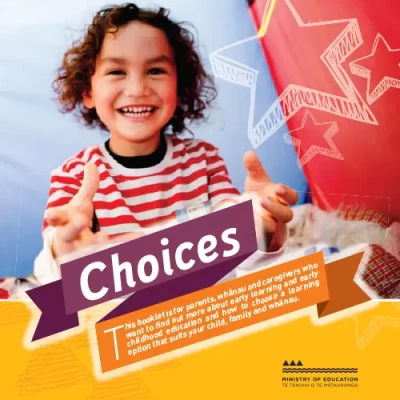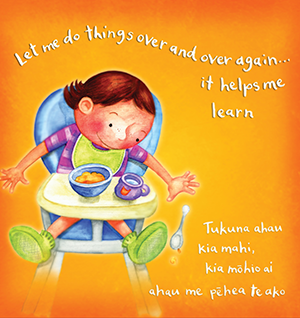
Off to an early learning service
A quality early learning service will provide all-round benefits for children’s learning and development, but whānau and home are still the most important influences on their tamaiti.
Connecting with an early learning service
Many children will have already joined an early learning service (ELS). However, in other families there may be reasons why a child has yet to be enrolled.
As a whānau supporter, familiarise yourself with the services in the local area. Visiting the service with the whānau can make them feel a lot more comfortable, especially when they’re not familiar with ELSs.
Have a conversation to find out what the whānau is wanting for their tamaiti.
Te Whāriki
Talk a little about Te Whāriki – the early childhood education curriculum used by early learning services.
Te Whāriki | Ministry of Education(external link)
It emphasises that all children are:
- encouraged to learn in their own ways
- encouraged and supported by adults who know them well and have their best interests at heart.
Also download a copy of the Ministry of Education’s Choices(external link) booklet. Talk about some of the topics in there. There are many questions you and the parents could ask the early learning centre.
After you’ve visited a centre, ask whānau:
- How did you feel about that visit?
- What did you like about the centre?
- Was there anything that you didn’t feel good about?
- How did the children seem? What was the mood like?
- What about the adults – what sort of interactions were happening there between the adults and tamariki?
- What about for whānau? How inviting did you feel it was?
- How are the cultures of the families reflected there?
Learning at school and at home
It’s important that 3-year-olds have an opportunity to attend an ELS. They are many benefits, but that doesn’t mean that all their needs can be met by the service. Yes, they’ll meet new friends, have other adults to guide and support them and have lots of opportunities for play, but relationships with parents and other whānau members will always be the most important.
Remind whānau how special they are and how significant their playing, talking, singing and reading with their tamaiti is.
Keep looking at the activities throughout this Parenting Resource. Remember how valuable and important it is for tamariki and their whānau to keep playing and learning together, and encourage whānau with activity ideas.
In summary, getting a good fit with an ELS is really important for a tamaiti and their whānau. A quality centre will provide all-round benefits for children’s learning and development.
This is a child’s first step into the wider world, but it’s only a step. Whānau and home are still the most important influences on their tamaiti. What parents do and how they are with their tamariki are the most important factors that influence how tamariki develop.
Helpful resources for whānau
-
Choosing an early learning service
Ministry of Education
Tips to keep in mind for parents and whānau making a decision on an early learning service.
-

Early childhood education choices booklet (PDF, 7.1 MB)
Ministry of Education
This booklet is for parents, whānau and caregivers who want to find out more about early learning and early childhood education and how to choose a learning option that suits their child and whānau.











